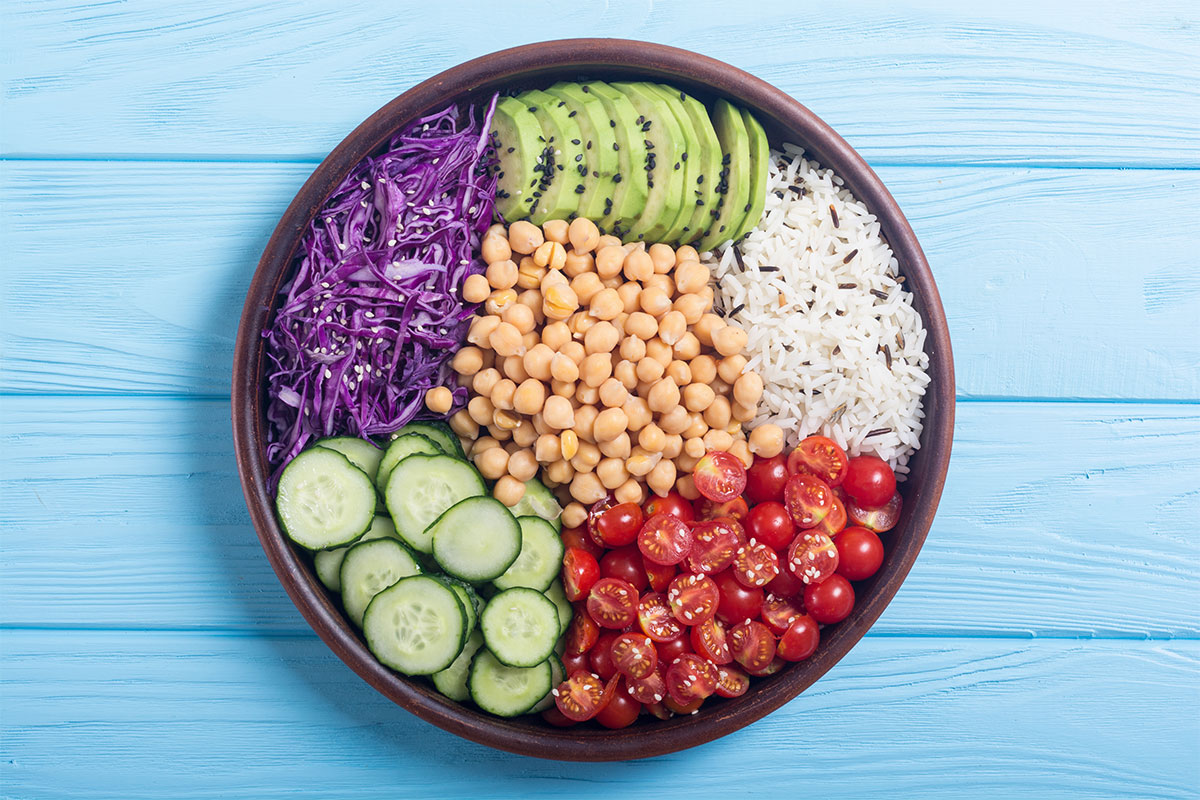Salt Grains for Muscle Gains?
Does liberally salting your food help you pump more iron in the gym? Registered Dietitian, Debbie James, investigates the claims!


Hello, I am vegetarian and do not eat meat or eggs but do eat dairy products. Can you let me know the following?
Thanks for your help.
– Sunil J.

Here are your three-fold answers:
1. A well-balanced lacto-vegetarian diet can be sufficient to promote muscle growth and strength when paired with an appropriate workout plan. The bigger you are and the more you burn the more nutrition you need – but also the more you can eat! A sample 2,800 calorie day might look like the following. Also see our recent suggestions for meatless meals.
Nutrient analysis using www.FitDay.com by a Registered Dietitian Nutritionist = 127 gm Protein (16% calories). Findings were used along with RDN’s professional judgment.
2. Before strength training (assuming last meal was more than 3 hours prior) a small snack incorporating a carbohydrate with some protein, but little fat can fuel your workout and help prevent muscle protein breakdown. One example is rice or oat square cereal with non-fat milk and strawberries. Another would be noodles and chunky marinara with a soy meatball. After working out, replenish energy stores and promote muscle repair and rebuilding with a similar recovery snack within a half hour. Graham crackers with peanut butter and banana slices is an option.
3. Protein powder aids in providing variety and convenience to meals or snacks on the go. When mixed with fluid as a beverage, protein powder is more readily absorbed than a solid protein you’d need to chew and break down. A balance of soy, casein, and whey can offer a more sustained delivery of protein.
– Debbie J., MS, RD
This article should not replace any exercise program or restrictions, any dietary supplements or restrictions, or any other medical recommendations from your primary care physician. Before starting any exercise program or diet, make sure it is approved by your doctor.
Some questions have been edited for length and/or clarity.
 Have a nutrition question? Our registered dietitian is ready to help!
Have a nutrition question? Our registered dietitian is ready to help!
Email nutrition@lafitness.com or submit your question below and it may be featured in an upcoming article!
Does liberally salting your food help you pump more iron in the gym? Registered Dietitian, Debbie James, investigates the claims!
Debbie James, RDN, helps answer a question about energizing snack options to pull athletes through the second half of a high energy workout.
Registered Dietitian, Debbie James, helps answer a reader’s question about a good nutrition guide for a healthy pregnancy.


Do you recommend a weight loss supplement?
– Brian N.

Hi Brian, I’m so glad you asked my opinion! Powder supplements of actual food components (such as of protein and fibers) can be quite useful in an energy-restricted diet since reduced total food volume can limit intake of certain nutrients. A general multivitamin/mineral supplement providing 100% DRI may also be suitable. These may not directly promote weight loss in themselves but can help the body maintain a healthy status while losing weight and indirectly help by curbing appetite.
Pill supplements of other compounds are nearly the last thing I recommend for weight loss, usually after other interventions have failed. There are many downsides to using popular supplements such as fat burners, appetite suppressants, and metabolism boosters. Due to personal biochemistry, their effects on physiology (positive or negative) may be as great as that of prescription weight loss drugs. The efficacy of a supplement should be weighed against its safety. According to the National Institutes of Health*, the compounds with “possible modest effect” on weight, fat mass or waist circumference include African mango, caffeine, green coffee bean extract, green tea, carnitine, and white kidney bean. Reported side effects include various GI disturbances, headaches, difficulty sleeping, urinary tract infections, increased blood pressure, and liver damage.
* Source: https://ods.od.nih.gov/factsheets/WeightLoss-HealthProfessional/ Accessed 3.11.2019
– Debbie J., MS, RD
This article should not replace any exercise program or restrictions, any dietary supplements or restrictions, or any other medical recommendations from your primary care physician. Before starting any exercise program or diet, make sure it is approved by your doctor.
Some questions have been edited for length and/or clarity.
 Have a nutrition question? Our registered dietitian is ready to help!
Have a nutrition question? Our registered dietitian is ready to help!
Email nutrition@lafitness.com or submit your question below and it may be featured in an upcoming article!
Does liberally salting your food help you pump more iron in the gym? Registered Dietitian, Debbie James, investigates the claims!
Debbie James, RDN, helps answer a question about energizing snack options to pull athletes through the second half of a high energy workout.
Registered Dietitian, Debbie James, helps answer a reader’s question about a good nutrition guide for a healthy pregnancy.


I saw this email address at LA Fitness and was hoping you could help me out with dieting which is my major downfall. I lift 3-4 times a week but am seeing no results due to my eating. I’m a very picky eater and can’t force myself to eat chicken every day. I need help!!! Please!!!
– Missy

Not knowing what you will eat, it’s difficult to provide guidance on suitable meals. Strictly speaking of protein sources – alternatives include pork tenderloin, turkey breast, fish, 7% ground beef, extra lean ground turkey, sirloin or tenderloin beef, and shellfish in nearly an equal ounce to ounce replacement for chicken. Non-flesh proteins include eggs & egg whites, low fat plain Greek yogurt, low-fat cottage cheese, legumes/beans, and lite tofu. Amounts of these equaling 3 oz. chicken vary due to volume measurements. Nuts, nut butters, and cheeses aren’t as diet-friendly since they’re higher in calories with a significant amount of fat for the same amount of protein.
If personal preference (or a strict dietary, philosophical or religious restriction) limits the variety of foods you consume then you need to experiment with textures, cooking methods and flavor combinations to increase palatable options. Some people that dislike whole peas can eat split pea soup with ham or a pea-hummus. Many vegetables can be replaced by purees or baked vegetable crisps. Did you know that temperature brings out the aroma of foods? By serving foods that are less desirable cold, the perceived flavor is muted. This works particularly well for meats and grains. If a hot chicken alfredo with fettucine, broccoli, and peppers as an entrée is overwhelming try it as cold chicken pasta salad side dish to other preferred foods.
Hopefully, with a little experimentation and substitution, you can find suitable foods for your weight loss goals. For long term success, enjoying what you eat is better than just tolerating it – you’re more likely to make permanent lifestyle changes.
– Debbie J., MS, RD
This article should not replace any exercise program or restrictions, any dietary supplements or restrictions, or any other medical recommendations from your primary care physician. Before starting any exercise program or diet, make sure it is approved by your doctor.
Some questions have been edited for length and/or clarity.
 Have a nutrition question? Our registered dietitian is ready to help!
Have a nutrition question? Our registered dietitian is ready to help!
Email nutrition@lafitness.com or submit your question below and it may be featured in an upcoming article!
Does liberally salting your food help you pump more iron in the gym? Registered Dietitian, Debbie James, investigates the claims!
Debbie James, RDN, helps answer a question about energizing snack options to pull athletes through the second half of a high energy workout.
Registered Dietitian, Debbie James, helps answer a reader’s question about a good nutrition guide for a healthy pregnancy.


I’m reaching out to ask for guidance with nutrition. I’m having a very hard time losing weight. I have small kids, so I don’t get enough sleep and I can’t change that, but I’ve been doing a 1,200-calorie diet for 6 months with no results. Can I ask for advice in a very specific diet plan, something that can be written out for me for every meal and snack? I need someone to tell me exactly what to eat. I’ve tried going lower than 1,200 calories to see if weight goes down, but it doesn’t. I do not understand why I’m not losing weight when people around me diet and lose tons of weight in just a few months.
– Melanie

While we can’t give you a specific diet plan, I can offer you some suggestions.
First, it may be that 1,200 calories are too low for you and your body is trying to conserve. Keeping up with little ones burns a lot of energy! Try estimating your calorie needs with an online calculator from a reputable source that includes age, height, weight, gender and activity level.
Second, the quality of what you eat matters more than the caloric value. Choose unprocessed whole grains and produce, lean proteins and dairy, and healthy plant fats for your meals and snacks. Avoid sugary beverages and alcohol.
Also, how and when you eat can affect your body’s response to overall calories. Chew slowly and thoroughly to allow the proper satiety cues to reach your brain. Don’t skip meals or eat late at night.
Last, you can follow an array of sample menus to craft a week’s worth for yourself. Here’s a 1,200 calorie day and 1,500 calorie day to get you started.
Don’t forget to utilize your local LA Fitness club’s Kids Klub for less than the cost of an at-home sitter so you can get in a good workout stress-free.
– Debbie J., MS, RD
This article should not replace any exercise program or restrictions, any dietary supplements or restrictions, or any other medical recommendations from your primary care physician. Before starting any exercise program or diet, make sure it is approved by your doctor.
Some questions have been edited for length and/or clarity.
 Have a nutrition question? Our registered dietitian is ready to help!
Have a nutrition question? Our registered dietitian is ready to help!
Email nutrition@lafitness.com or submit your question below and it may be featured in an upcoming article!
Does liberally salting your food help you pump more iron in the gym? Registered Dietitian, Debbie James, investigates the claims!
Debbie James, RDN, helps answer a question about energizing snack options to pull athletes through the second half of a high energy workout.
Registered Dietitian, Debbie James, helps answer a reader’s question about a good nutrition guide for a healthy pregnancy.


I’m hoping to get dietary advice for fat loss. I’m currently eating a Paleo diet with a smoothie for breakfast and salads with protein and maybe a sweet potato for lunch and dinner with no added sugar and plenty of healthy fats. This type of diet used to yield results for me, but now my weight and body fat percentage seem to stay the same no matter what I do. Any advice is much appreciated.
– Heather C.

When a successful diet approach no longer works, there might be a few possibilities as to why. Depending on how long ago your last attempt was, the age-related effects on metabolism could be slowing things down. You could be close to your ideal body weight range, so your body may be trying to hold onto its fat. It could be that while you’re adhering to the same restrictions, your portions or between-meal snacking have crept up. Also, your activity level and lifestyle may not be as they were when you got results in the past.
A person can still be micronutrient-deficient in areas on any diet1, especially if your day-to-day meal plan is repetitive. One of the pitfalls to a Paleo diet could be iodine deficiency2 which can affect metabolism (via the thyroid gland). To avoid undernutrition, rely on whole foods not packaged Paleo foods, double vegetable intake beyond salad (like calcium sources: kale, spinach, cauliflower, broccoli, collard greens, Brussel sprouts), incorporate eggs and mushrooms for vitamin D, and vary your intake daily.
You may be surprised that when you’re meeting your full nutritional needs with adequate sleep and exercise, your body responds with easier weight loss!
References:
– Debbie J., MS, RD
This article should not replace any exercise program or restrictions, any dietary supplements or restrictions, or any other medical recommendations from your primary care physician. Before starting any exercise program or diet, make sure it is approved by your doctor.
Some questions have been edited for length and/or clarity.
 Have a nutrition question? Our registered dietitian is ready to help!
Have a nutrition question? Our registered dietitian is ready to help!
Email nutrition@lafitness.com or submit your question below and it may be featured in an upcoming article!
Does liberally salting your food help you pump more iron in the gym? Registered Dietitian, Debbie James, investigates the claims!
Debbie James, RDN, helps answer a question about energizing snack options to pull athletes through the second half of a high energy workout.
Registered Dietitian, Debbie James, helps answer a reader’s question about a good nutrition guide for a healthy pregnancy.
Be the first to know about exclusive
content, deals and promotions